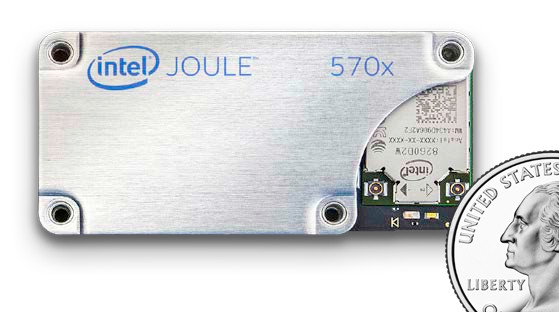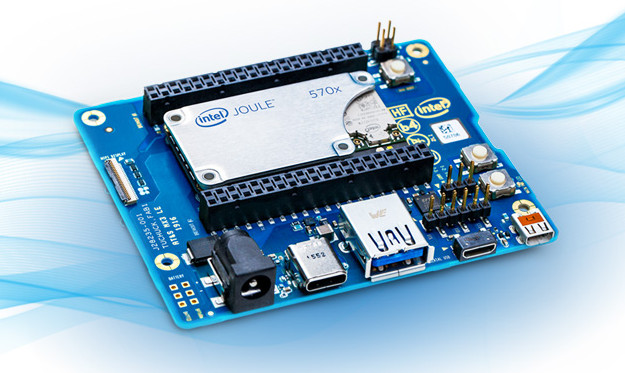As the Intel Developer Forum 2016 is now taking place in San Francisco, Intel has unveiled the Joule Compute Module and development kit targeting IoT applications. The module is not for low cost and low power sensor nodes however, as it features a powerful quad core Atom processor running at 1.5+ GHz, so it more suited to IoT gateways, or other application requiring lots of processing power to handle sensor data.
 Two models of the Joule module have been introduced:
Two models of the Joule module have been introduced:
- Intel Joule 570x platform
- SoC – Intel Atom T5700 64-bit quad-core processor @ 1.7 GHz / 2.4 GHz (Burst frequency) with Intel HD Graphics with 4K video capture and display
- System Memory – 4GB LPDDR4 RAM
- Storage – 16GB eMMC memory
- Connectivity – 802.11ac Wi-Fi with MIMO and Bluetooth 4.1
- Other interfaces – USB 3.0, MPI CSI and DSI interfaces, and multiple GPIO, I2C, UART interfaces
- Intel Joule 550x platform
- SoC – Intel Atom T5500 64-bit quad-core processor @ 1.5 GHz with Intel HD Graphics with 4K video capture and display
- System Memory – 3GB LPDDR4 RAM
- Storage – 8GB eMMC memory
- Connectivity – 802.11ac Wi-Fi with MIMO and Bluetooth 4.1
- Other interfaces – USB 3.0, MPI CSI and DSI interfaces, and multiple GPIO, I2C, UART interfaces
Both modules run Ostro Linux-based OS – built with the Yocto Project – tailored for IoT and smart devices, and support Intel RealSense cameras and libraries. Intel also mentions that “Developers can choose to develop on Ubuntu/Ubuntu Core (Snappy) or Microsoft Windows 10 IoT Core”.
The modules are already used to develop several products and demos including PivotHead smart glasses used by Airbus for quality control, Vstone bartending robot featuring a RealSense camera to track a person’s face, Eyelights highway patrol motorcycle helmet display used to read license plates, Microsoft Bamboo robotic companion to help parents of children with diabetes, Canonical robots to demonstrate Ubuntu Core and the Robot Operating System (ROS), as well as Gumstix custom carrier boards for Joule Compute Module.
Intel will offer a developer kit for each version of the Joule module, but currently on Joule 570x developer kit can be purchased through partners such as Mouser and Newegg for $370, and Joule 550x devkit will be launched on Q4 2016.
Joule 570x devkit specifications:
- Joule module based on Intel Atom T5700 processor with 4GB RAM (PoP), 16GB storage, 2x 100-pin connectors
- Storage – micro SD slot
- Video Output – micro HDMI port
- USB – 1 x USB 3.0 port, 1x USB 3.0 type C OTG port
- Camera – 2x 4-Lane MIPI CSI Connectors
- Expansion – 2x 40 pin females header with 3.3V (5V tolerant) signals for I2S, digital microphone, PCIe, I2C, RTC, SPI, SDIO, UART, PWM, GPIOs, MIPI DSI…
- Debugging – 1x micro USB port for serial console
- Power – 12V via Power barrel
- Dimensions – Joule module: 48 x 24mm
Beside the board and module, the kit includes a micro-SD card, a type-A to type-C micro USB cable, two Wi-Fi antennas, and a heatsink and fastener. The board will run Ostro OS with Linux 4.4 and application framework for Node.js, Python, and C/C++ applications. The “BIOS” will be an open source UEFI implementation. Software development tools include Intel XDK IoT Edition and Intel System Studio IoT Edition, Intel RealSense API support, and Intel IoT Developer Kit.
While you can get the devkit right now, Intel Joule 570x and 550x platforms will only become broadly available in Q4 2016 at an undisclosed price. They will be available is over 100 countries by the end of Q4 including the United States, Canada, Japan and most of Europe. More details can be found on Intel Joule IDF page.

Jean-Luc started CNX Software in 2010 as a part-time endeavor, before quitting his job as a software engineering manager, and starting to write daily news, and reviews full time later in 2011.
Support CNX Software! Donate via cryptocurrencies, become a Patron on Patreon, or purchase goods on Amazon or Aliexpress. We also use affiliate links in articles to earn commissions if you make a purchase after clicking on those links.





there is something i fail to understand with intel…
– on one hand they close their “atom for mobile” division,
– on the other hand, they announce products based on those products.
do you guys have some information/explaination/rumor ?
@nobe
My understanding is that they’ve stopped working on new mobile Atom SoCs, but will keep selling their Atom Bay Trail and Cherry Trail processors.
IoT is a different market, and they’ve apparently decided to keep designing and manufacturing new Atom SoCs for that market.
@nobe
Intel announced the end of atom including a 3g/4g modem for cellphone market. I think they never want to stop atom for all over product lines : dongle, mini-pc, tablet, server, iot …
A bit more about Ubuntu Core on Intel Joule @ http://insights.ubuntu.com/2016/08/16/intel-joule-board-powered-by-ubuntu-core/
the price ouha… 370$ for the 570x or 430€
Seems like even rpi3 can beat intel soon if it would have the 4gb RAM and a little bit more 4k performance. But somebody can by 10 rpi3 boards comparable to single intel one 😉
@nobe
In Intel’s view, tablets, phones, and PCs, are now part of the Internet of Things.
I saw the same reports that “Atom was dead” that everyone else did. I just think they were false reports, layered from bad info about Intel pulling out of mobile.
Intel is still selling tablets, heck, even Android tablets in China are strong sellers. The only two real drawbacks from Intel is that Joule/Broxton will not run Android, but Android support will continue on Cherry Trail until the next generation.
Which, makes sense. In terms of Android I/O, Cherry Trail already does for Android ~90% of what Joule does for other platforms.
Bottom line: Rumors and Reddit are great for bombastic headlines – but rarely are true. Atom is not dead. Intel is still committed to Android – just taking a break from phones until 5G. That’s all really.
Full Disclosure: My startup is shipping an Android tablet – none of the above is secret sauce… I’ve been saying it all week from my booth at IDF 2016.
If you try to observe the last year market you can see that people are moving from expensive PC to cheap mobiles & chromebooks. The same trend we can see in the IoT world. But Intel failed here too much times and I do not see reasons how it can be successful again with such $370 IoT solutions or expensive mobile CPU’s. Their first epic fail (TM) was at 2006 when they sold XScale branch to Marvell just because they thought that ARM had no future
comparing to the Atom. And first Android phone was sold in 2008…
Now hundreds (!!!) companies are manufacturing the ARM CPU’s and successfully selling it. So no wonder that it is now the mostly spreaded and good designed CPU. And now we can see that Atom failed in the same way as their Itanium – nearly nobody use it.
Intel can do good only one thing – chip manufacturing, so it is ok to rent their chip fabrics and produce some faster ARM’s :
http://fortune.com/2016/08/17/intel-arm-10nm/
I think that most Intel fail is that this company is not able to introduce the new trends to our world. Yes you are right – they are not dead – in the same way as microsoft in mobile world (<1%)